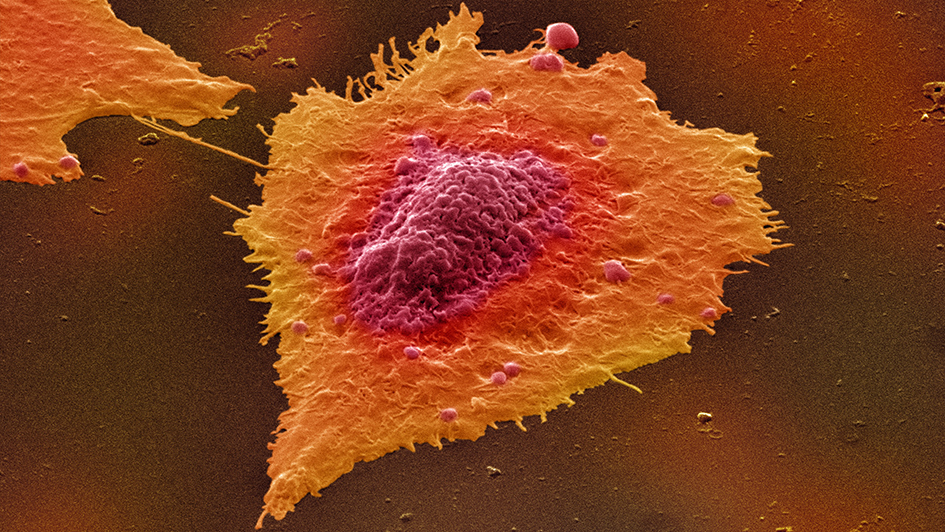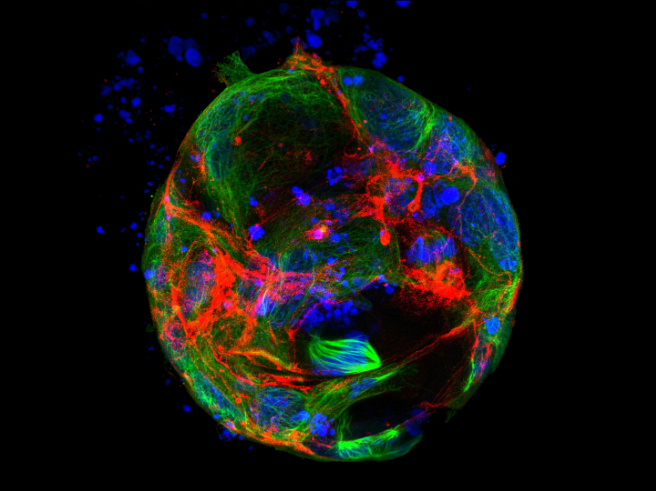
Image: Colour-enhanced image of human colon cancer cells in culture. Credit: Annie Cavanagh. License: CC BY-NC 4.0
A new test can genetically ‘barcode’ bowel cancer and separate it into five different diseases that could each receive tailored treatment, a new study reports.
Scientists have in recent years found that bowel cancer is actually five distinct diseases, with different biological characteristics which affect how they respond to drugs.
The new genetic test can diagnose a person’s specific type of bowel cancer in a matter of hours, rather than the months it can take using existing tools.
After testing, patients could be offered treatments that work best for them and spared those that are unlikely to work – improving their care and saving the NHS money.
Using 'barcodes' to pick out bowel cancer types
Scientists at The Institute of Cancer Research, London, developed a new test based on molecular ‘barcoding’ technology to tell apart different forms of bowel cancer.
They selected 38 genes to include in their new test, which works by detecting patterns of gene activity typical of each of the five known types of bowel cancer.
The researchers applied the test to six sets of tumour samples from a total of 350 people with bowel cancer, to study how accurately it could distinguish between different types.
Their study is published in the journal Scientific Reports today, and was funded by the ICR itself, with additional support from the Rosetrees Trust and Cancer Research UK.
Suitable for use in the clinic
In the largest set of tumour samples, the test picked out 15 per cent of patients with the most aggressive, ‘stem-like’ form of bowel cancer, and 9 per cent with the ‘inflammatory’ subtype, which could help pick out patients more likely to respond to immunotherapy.
Comparing the test’s performance with older analytical tools, the team found that it was similarly accurate at picking out the different types of bowel cancer, while relying on far fewer genes than the 800 originally needed to tell them apart.
Importantly, the test worked well on tissue samples that had been frozen, and also those preserved in formalin – making it highly suitable for use in the clinic.
The new research comes a week after the ICR, a charity and research institute, announced a £75 million investment in an ‘anti-evolution’ drug discovery programme specially designed to tackle cancer’s lethal ability to evolve resistance to treatment.
Next, the team is planning further research to study the test’s benefit, and to assess how it can inform treatment planning and improve patient outcomes as part of clinical trials.
We are building a new state-of-the-art drug discovery centre to create more and better drugs for cancer patients. To make our building a reality, we urgently need your philanthropic support.
Innovative genetic barcoding technology
Dr Anguraj Sadanandam, Team Leader in Systems and Precision Cancer Medicine at the ICR, said:
“Since we identified distinct forms of bowel cancer back in 2013, our knowledge of the different types has helped transform understanding of the disease and why patients do or don’t respond to particular treatments.
“Now we have created a new test that makes use of genetic barcoding technology to tell apart different types of bowel cancer more quickly and cheaply than has been possible up to now. Our research has brought bowel cancer testing closer to the clinic, where we hope it will soon start making a difference for patients.”
Professor Paul Workman, Chief Executive of the ICR, said:
“Over recent years it has become increasingly clear that our old labels for cancers based on where they are in the body are inadequate as a basis for choosing treatment.
“Bowel cancer for example is at least five separate diseases, and each needs its own tailored treatments if we’re to help patients live longer and healthier lives.
“This exciting new research makes use of innovative genetic barcoding technology to assess activity across 38 genes – and can discriminate between different types of bowel cancer as accurately as earlier analyses of 20 times as many genes.
“I am keen to see the new test further validated so it can begin benefiting patients on the NHS.”
